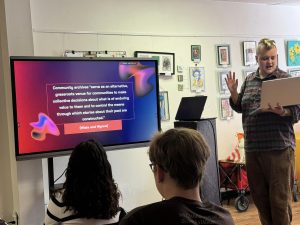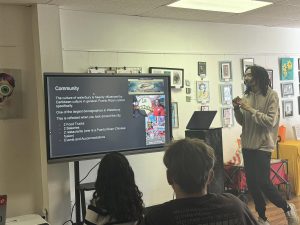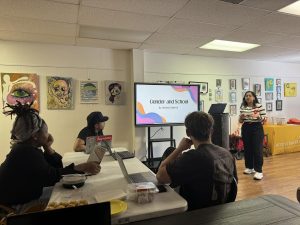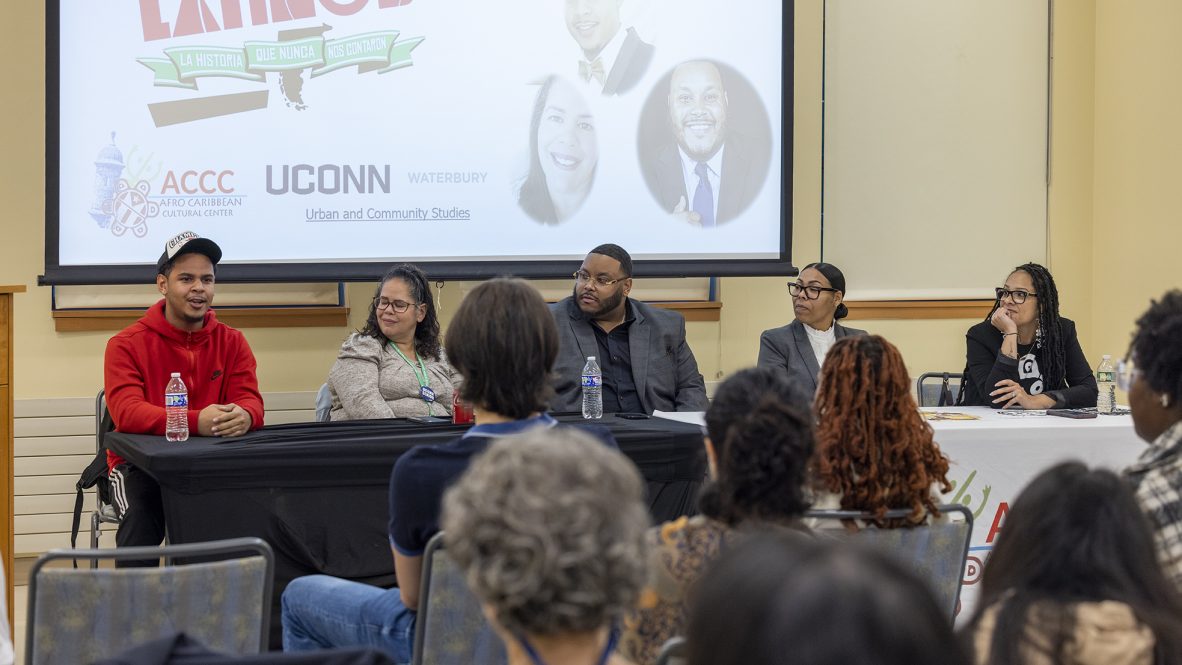Students from UConn Waterbury are developing a digital library to highlight the unheard and hidden stories of Latin American and Caribbean communities in Waterbury. This initiative is a collaboration between the Urban and Community Studies program at UConn Waterbury and the Afro-Caribbean Cultural Center.
This initiative emerged from discussions among community members, faculty, and students about the overlooked narratives of Latin American, Latine/x, and Caribbean groups —such as questions about what it means to be Afro-Latinx— in Waterbury. Finding specific accounts of these communities can be particularly challenging. According to Rafael Feliciano Roman, the executive director of the Afro-Caribbean Cultural Center, there is currently no dedicated space for community members interested in learning about their heritage and local history. Much of this information is scattered across various institutions, so centralizing it on a single platform would greatly benefit the Waterbury community.
The project aims to preserve and provide digital access to unique archival documents from a network of Latin American partners and community members, focusing on collections that address human rights issues and underrepresented communities. Through their course semester projects in GEOG3000: Race, Sex, Space, and Place, UCS students detailed their interdisciplinary approach to creating the platform, motivations, the necessity for a digital library, and initial planning process for the digital platform while connecting their work to their future careers and interest.
Communal Digital Archive: Gabriel Blauvelt ’24 (CLAS), Major: English

My project provided steps towards creating and maintaining a community digital archive for the Afro-Caribbean Cultural Center in Waterbury. A community archive is independent of governmental institutions, schools, or historical societies to which community members can add data. They are often easier for individuals to access, as they do not require membership like the archives in universities may. The collective data gathering also creates the opportunity to preserve information that more official archives may not consider significant, such as interviews with community members about historical events. A traditional archive may overlook the first-hand account of such an interview in favor of sources such as newspaper articles. Both are valuable sources of information, but community-driven archives can help to preserve endangered information and allow communities to direct the stories important to them, which helps to provide a more holistic view of their history. I focused on this for my final project, which ties into my planned career path. I plan to get a degree in library sciences and pursue a job in archival work. I am particularly interested in helping libraries digitize their existing collections, as it makes them more accessible and is another layer of protection from the information being completely lost.
Preserving Our Cultural Heritage Through Food, Memory, and Tradition: Julian Lewis ‘26 (CLAS), Major: Sociology

I am interested in how food can serve as a source of learning, connection, and memory-building among Latin American families, particularly regarding how we can preserve these traditions in a city rich with Latin American and Caribbean cuisine. My focus was on exploring these themes through the preparation of a staple cultural dish and a cherished family recipe. This journey involves examining the food we eat and considering how it reflects broader narratives of migration, feminist geographies, and environmental conditions.
Most importantly, I later realized that my project was about deepening my connection with my grandma. This intergenerational conversation around food reflects relationships built on transnationalism and the bonds between family members, which are at the heart of creating a community digital archival platform. Highlighting this story is significant to me because passing down familial knowledge and culture is essential. Food acts as an artifact that tells the living history of a people and their culture. Rice, for example, became a staple in my household and for many others because the necessary ingredients and labor were minimal. This aligns with the working-class life that my grandma and many others have experienced here in Waterbury and in other cities like it. Through this project, I reflected on how the quality of ingredients reflects the environmental pollution and racism that Latinx people disproportionately face, viewing this as a form of resistance. Investigating community engagement with food by documenting these narratives often reveals hidden stories that significantly impact everyday community dynamics in cities.
Advocacy and Social Justice in Education: Adriana Figueroa’26 (CLAS), Major: Urban and Community Studies

My project focused on access to education from a gender perspective, specifically to show the gap in higher education completion among male Hispanic immigrant students. According to a Hispanic Heritage Month news source, Latinos are the least educated population group in the nation, with Latino males averaging only 10.6 years of schooling, compared to 12.2 years for Black males and 13.3 years for White males. Only 11% of Latinos aged 25 and over have a bachelor’s degree, compared to 29% of Whites and 25% of other non-Hispanics.
Documenting Latino youth’s access to education is an important topic in our city. Hence, gathering these experiences can provide a variety of insights into how migrant youth might not do well in school. This is a very close topic to me since my brother is one of the Latino males who face numerous external obstacles while trying to continue his education. Similarly, many of my male classmates in high school dropped out because they needed to support their families. Analyzing and mapping historical accounts and student experiences can provide valuable insights into the barriers that Latino students face today, including socioeconomic and language challenges, mental health issues, unstable home environments, and cultural expectations. By gaining insights into these issues, others can engage with this information and expand research on Latin American access to education in Waterbury. Potentially, community members can create strategies that promote community well-being and empowerment in Latino youth education. By documenting the struggles and achievements of these communities, digital archives can be used as a tool for advocacy, helping to highlight systemic issues or historical injustices and promoting ongoing social and political action.
Mapping, documenting, and digitalizing Latin American and Caribbean communities’ collaboration will continue during Fall 2025 and Spring 2026 through URBN1300: Exploring your Community and GEOG3000: Race, Sex, Space, and Place with Dr. Argañaraz Gomez in UConn Waterbury in collaboration with the Afro-Caribbean Cultural Center.



